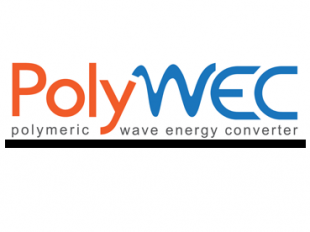This Project introduces a new class of Polymeric WECs (PolyWECs), characterized by the employment of Electroactive Elastomer (EE) transducers. The goal is to introduce a radical change in the traditional architecture of WECs that usually includes three basic components: mechanical wave absorbers, a mechanical transmission and a power take-off system. Due to their nature, PolyWECs can be conceived in a way that such three components are integrated into a single deformable lightweight and low-cost polymeric element.
The principle of operation is explained in a short video:
The aim of the Project is to develop new knowledge and new technologies aiming at:
- optimizing EE materials for WEC applications
- conceiving new electro-mechanical configurations for PolyWECs
- studying the fluid-EE interaction through numerical simulations
- performing wave-tank tests of small scale prototypes
- providing economic and environmental assessment
The University of Edinburgh has been undertaking wave flume and wave basin tests of the wave energy converters and looking at the techno-economic assessment of the technology. Video from the flume tests is also available on YouTube:



